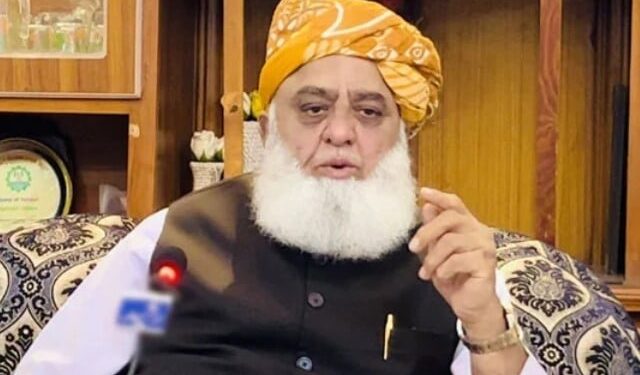Lahore: Chief of Jamiat Ulema-e-Islam-Fazl (JUI-F), Maulana Fazlur Rehman, made a strong statement addressing both regional and international issues during his speech at the National Conference for Solidarity with Palestine held at Minar-e-Pakistan. He expressed unwavering support for the people of Palestine and warned India of dire consequences if it chooses to engage in hostility against Pakistan.
Saluting the Courage of Palestinians
Speaking to a large and emotionally charged gathering, Maulana Fazlur Rehman paid tribute to the resilience and sacrifices of the Palestinian people, who continue to resist occupation and aggression.
“The people of Palestine are sacrificing their lives for their freedom and land,” he said. “I salute their spirit, courage, and perseverance.”
Maulana Fazl emphasized that even if the world remains silent or turns a blind eye, the Pakistani nation stands firmly with Palestine in its struggle for freedom and dignity.
“Whether the world supports them or not, the people of Pakistan are wholeheartedly with the Palestinians,” he asserted.
Condemning International Hypocrisy
In a powerful rebuke of the international community’s double standards, the JUI-F leader criticized the United Nations and human rights organizations. He pointed out the blatant hypocrisy in labeling the killing of innocent children in Gaza as part of a “defensive war.”
“If the killing of innocent children is called a defensive war, then it is a grave injustice,” Maulana Fazl stated.
He stressed that the credibility of international law and institutions is at stake when they allow such atrocities to occur under the guise of defense.
Calling for Accountability of Israeli Leadership
Maulana Fazlur Rehman went further to demand accountability for Israeli leaders responsible for the massacres in Gaza, particularly targeting Israeli Prime Minister Benjamin Netanyahu.
“The Israeli leadership, especially Netanyahu, is a war criminal,” he declared. “The International Court of Justice must punish him just as Saddam Hussein was punished for his crimes.”
The comparison drew strong reactions from the audience, many of whom expressed their anger over the apparent immunity enjoyed by powerful nations and their leaders in today’s geopolitical environment.
Criticism of Global Power Dynamics
Highlighting the inequality embedded within international laws, Maulana Fazl noted that justice today has been hijacked by power politics.
“Today, the laws of the world operate only in the interests of the powerful,” he said. “Power is enforced in the name of justice.”
He lamented that weaker nations and oppressed people continue to suffer while international institutions remain either complicit or inactive.
Expressing Regret over Pahalgam Incident
Maulana Fazlur Rehman also touched upon the recent attack on unarmed tourists in Pahalgam, expressing his deep regret over the incident. However, he pointed out the hypocrisy of India’s reaction to violence when its own policies support the oppression of Palestinians.
“India expresses sorrow over attacks on its citizens but stands with Israel when it bombs the innocent people of Gaza,” Maulana Fazl remarked.
Exposing India’s Anti-Muslim Policies
He strongly criticized India’s historical and ongoing hostility towards Muslims. Maulana Fazl said that India’s alliance with Israel is a continuation of its long-standing animosity against Muslim nations and communities.
“India has been an enemy of Muslims for decades,” he said. “By openly supporting Israel’s brutal actions in Gaza, India has once again exposed its true face.”
Strong Warning to India
Delivering a stern warning to India, Maulana Fazlur Rehman said that any aggression against Pakistan would lead to disastrous consequences for New Delhi, far worse than the outcomes it faced during the 1965 war.
“If India dares to attack Pakistan, it will suffer losses greater than those it faced in 1965,” he warned, receiving loud applause from the crowd.
He reassured the nation that Pakistan’s defense forces, government, and people are united and prepared to defend their sovereignty at all costs.
Remembering the 1965 War
The 1965 war between India and Pakistan holds significant importance in Pakistan’s national memory. It is remembered as a time when Pakistan’s armed forces and its people showed immense courage and resilience, successfully defending the country’s territory.
By referencing the 1965 war, Maulana Fazl was invoking a powerful symbol of unity and patriotism among Pakistanis, strengthening national resolve in the face of current regional tensions.
Importance of National Unity
Throughout his speech, Maulana Fazlur Rehman emphasized the importance of national unity, particularly in the face of foreign threats and global injustices.
“Today, more than ever, the Muslim world needs unity and solidarity,” he stressed. “We must support each other in our struggles for freedom, justice, and dignity.”
He called on all Muslim nations to rise above internal divisions and present a united front against oppression, whether in Palestine, Kashmir, or elsewhere.
The Role of Pakistan in the Muslim World
Pakistan has historically been a vocal supporter of the Palestinian cause, consistently advocating for Palestinian rights on international platforms such as the United Nations and the Organization of Islamic Cooperation (OIC).
Maulana Fazl’s speech reaffirmed Pakistan’s traditional stance and underlined the country’s commitment to continuing its support for oppressed Muslim communities worldwide.
Conclusion: A Call to Action
Wrapping up his address, Maulana Fazlur Rehman urged the international community to wake up to the injustices being perpetrated against Palestinians and demanded concrete action rather than mere condemnations.
“The world must stop Israel’s atrocities and ensure justice for the Palestinian people,” he concluded.
The National Conference ended with passionate chants of solidarity with Palestine, reinforcing the message that Pakistan stands firm in its support for oppressed nations and will defend its own sovereignty with unwavering determination.

























